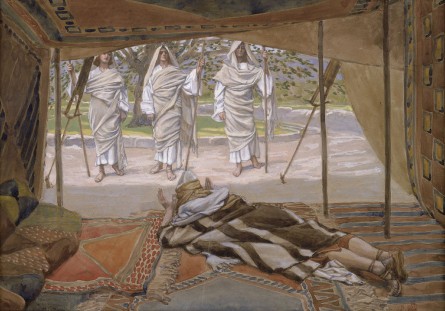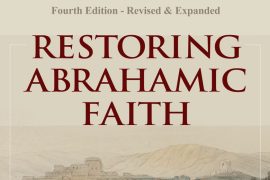As many of you know I have a new translation of The Book of Genesis now available in print and Kindle editions via Amazon. I have also begun a weekly series working through the book of Genesis, bit by bit, with hosts Jono Vandor and Ross Nichols on the Truth2U.org network. We have recorded two episodes and another will come out tomorrow. There is lots ahead but just to whet your appetite about things to come I wanted to say a few things about one of the most mysterious chapters in the Hebrew Bible–Genesis 18. In this account, which scholars believe comes from the so-called “J” tradition, Abraham encounters three men (Heb. אנשים) whom he hosts as honored visitors in good Middle Eastern style, washing their feet, giving them rest and shade, and fixing them a meal (meat and dairy combined–which I will ignore for now!). They are further identified as “messengers” (Heb. מלאכים), sometimes poorly translated as “angels,” two of which then proceed on to the cities of Sodom and Gomorrah to investigate their wickedness and deliver Abraham’s nephew Lot and his family from the impending destruction (Genesis 19).

The fascinating thing about this whole scene is that one of these three men is clearly identified as YHVH (Heb. יהוה Yahweh or Jehovah) and he begins to speak back and forth directly with Abraham following the meal, promising to return to Abraham and Sarah the following year and resulting in Sarah–now well past menopause at age 90–becoming pregnant with Isaac. This is apparently such a problem for the Masoretes who edited the final versions of the Hebrew Bible that they replaced the divine name YHVH with Adonai in vv. 3, 27, 30, and 32 and changed the phrase in v. 10 to read “And Abraham still stood before YHVH” rather than “And YHVH still stood before Abraham”–thinking it unworthy of YHVH to “stand before” Abraham in terms of showing deference. Abraham and YHVH then have an extended conversation in which YHVH introspectively questions within himself–“Shall I hide from Abraham what I am about to do?” and Abraham respectfully reminds YHVH that he must not destroy the righteous with the wicked–“Shall not the Judge of all the earth do justice?” The Abrahamic “seed and household” covenant is reiterated and the two then carry on a back-and-forth dialog over how many “righteous” it would take to save a wicked city. Once their conversation is completed YHVH simply walks away and Abraham returns to his place. “Subsequently, this “lower” YHVH calls down fire from YHVH in the heavens to destroy the wicked cities of Sodom and Gomorrah. Notice carefully the language:
Then Jehovah rained upon Sodom and upon Gomorrah brimstone
and fire from Jehovah out of heaven (Genesis 19:14)
Here Jehovah brings fire from heaven from Jehovah. For most readers this “walking, talking, eating, drinking” YHVH is simply an example of the rather blatant anthropomorphicism of the “J source.” But perhaps it is much more than that. Christians seized on this and other similar passages in the Torah that seemed to describe a very “human-like” YHVH, in contrast to One above whom “no man could look upon and live,” as evidence of a pre-incarnate manifestation of Christ! Paul hints at this in 1 Corinthians 10:4, assuring that the “Rock” that followed the children of Israel in the desert “was Christ.” Justin Martyr, in the mid 2nd century CE, developed his whole “Christology” around such passages. Starkly put–this YHVH of the “Old Testament” was none other Jesus himself–born as a human being! So one could hardly object to any sort of “Christ” devotion–even to the extent of equating Jesus with YHVH. [1]See David Capes very important study, Old Testament Yahweh texts in Paul’s Christology, J. C. B. Mohr, 1992. In other Jewish circles these texts became the basis for speculating about “two YHVHs,” and “upper” and a “lower,” and the possibility, eventually considered heresy, of “two powers in Heaven”–see the article “Metatron” in the Jewish Encyclopedia for references. [2]See Alan Segal’s classic work, Two Powers in Heaven: Early Rabbinic Reports about Christianity and Gnosticism, Baylor University Press, reprint, 2012
It is entirely possible, however, to understand this and other passages in the Hebrew Bible, where “one” YHVH–seems to speak in the third person about a second–and often more remote–“YHVH,” as a rather sophisticated narrative strategy of dealing an ancient Hebrew understanding, in some circles at least, of YHVH as existing on both human and meta-human planes of reality. In other words, a flesh and blood human being could speak and act in the name of, and in the person of, “YHVH.” The Prophets seems to reflect this understanding in any number of places, for example, Zechariah 2:8-10 [Hebrew text 2:12-13] or Isaiah 48:14-16. If you read these carefully you will see that the pronouns and antecedents shift, and it seems that the one speaking in the 1st person as YHVH is also “sent by YHVH,” and thus the Prophet himself, in this case, either Isaiah or Zechariah. Genesis 18 seems to be one of the first places that one encounters this mysterious phenomenon in the Hebrew Bible, and it was troubling to ancients as it likely is to careful modern readers as well. It surely does not fit well with later “Classic” understandings of Theism in the West. Notice, just as one example, the language in Genesis 18:17-19, where this mysterious third “personage” speaks in the first person, but references Jehovah in the third person:
For I have known him, to the end that he may command his children and his household after him, that they may keep the way of Jehovah, to do righteousness and justice; to the end that Jehovah may bring upon Abraham that which he hath spoken of him.
One might expect the text to say, “I have known him…that they may keep my Way…to the end that I may bring…” keeping with the first person. There are times when modern translations will in fact change the pronouns to reflect what they assume is a smoother and intentional meaning. There are hundreds of these examples where “one Jehovah” speaks of “another Jehovah” in the third person,” where the “upper” Jehovah seems to carry out the word reflected by the “walking, talking, eating, drinking” lower Jehovah on the earth. Scholars call this phenomenon the ‘intrusion of divine speech into the human.” Moses, for example, tell the Israelites, using the first person:
And I have led you forty years in the wilderness: your clothes are not waxed old upon you, and thy shoe is not waxed old upon thy foot. 6 Ye have not eaten bread, neither have ye drunk wine or strong drink; that ye may know that I am Jehovah your God. (Deut 29:4-6; cf. 7:4, 17:3, 28:20, 68)
Here we might expect the last phrase to read, “that you may know that He is Jehovah your God.” The Transparent English Bible carefully tracks and reflects these kinds of shifts, never changing them to smooth out the English in order to make it less problematic in terms of antecedents and references. All pronouns, singulars, plurals, masculines, and feminines are left intact–even if one might think they would more properly read with more consistency. This allows the reader to draw whatever conclusions as to meaning and implications one might determine–as you always have the transparent base text to work with.








Comments are closed.